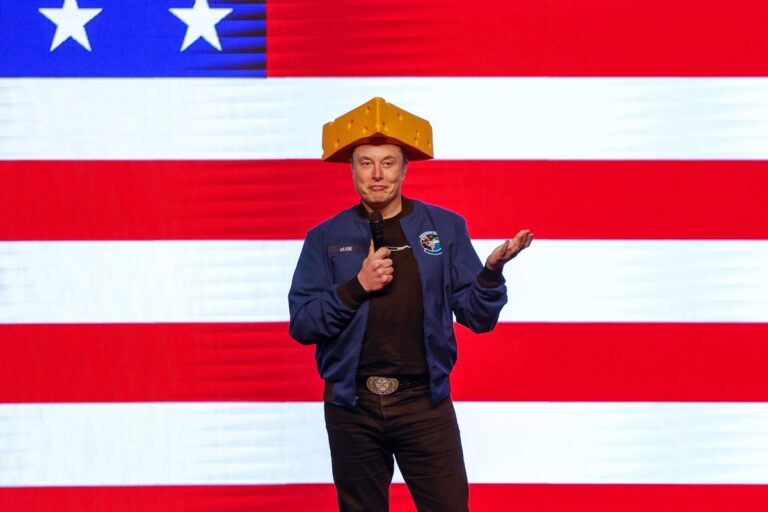You’d be forgiven for not noticing amid all the Donald Trump-induced chaos from the introduction of some of the highest tariffs in more than a century, which triggered stock market plunges not seen since the Covid lockdown. But First Buddy Elon Musk has had almost as reputation-crushingly bad a week as his boss.
While Trump was telling reporters that his tariffs plan was going “very well” – as countries lined up to retaliate with their own import taxes, the dollar sank, and the world’s largest tech company, Apple, watched as more than $300bn (£230bn) was wiped from its stocks – Musk’s social media platform X (formerly Twitter) found out it could face a $1bn fine from the EU for its failure to police disinformation and hate speech.
A messy, and doubtless theatrical court case is the likely result. But Musk could be the first CEO penalised under the EU’s Digital Services Act.
His brash embrace of Donald Trump, publicity stunts including a chainsaw-wielding appearance at the Conservative Political Action Conference (CPAC), and embrace of far-right political movements and parties in Europe, have also had a very visible impact on another of his businesses: Tesla.
According to the European Automobile Manufacturers Association, sales of the marque are going into reverse in what is a rapidly growing market. Tesla’s latest update said it had delivered nearly 337,000 electric vehicles in the first three months of 2025 – a decline of 13 per cent, and much worse than Wall Street had expected.
Yes, the product line has needed updating (Tesla’s preferred narrative for its sales woes), and it has also faced greater competition. But it seems increasingly clear that Musk’s toxic and divisive personal brand is polluting Tesla’s corporate brand. Reports abound of owners trading in their vehicles, on top of headline-grabbing dealership protests and incidents of vandalism by an angry corps of Musk critics.
A more normal board, with high-quality non-executive directors willing and able to stand up to a CEO who is damaging a company, would be taking action at this point. But Tesla does not have that, as the saga of Musk’s multi-billion-dollar pay package, and the court battles over it in Delaware, have made clear.
A substantial chunk of Tesla’s shareholder base is made up of fanboys, a cadre known as “Muskrats”. But even they must be feeling restive after the precipitous decline in shares.
True, Tesla looks set to face fewer headwinds from Trump’s tariffs than many of its competitors. The vehicles it sells in the US are made there, and so are its batteries. But that may not be enough to overcome the damage done to Tesla’s brand.
It speaks volumes that reports of Musk stepping down from his high-profile and inevitably divisive role at the head of the Department of Government Efficiency (Doge), charged with slashing the US federal government budget, sparked a rally in Tesla’s shares – which swiftly evaporated upon the issue of denials.
Brands are hard to build but easy to destroy. Tesla’s is being battered by the behaviour of a CEO who doesn’t appear to register that he has a problem.
His political clout may have reached its zenith, too. As is his wont, Musk inserted himself into the middle of what was officially a non-partisan race for a 10-year term on the supreme court of Wisconsin, one of the swing states Trump won, albeit narrowly.
The race went as you might expect, with Musk stoking controversy by promising $100 to anyone signing a petition against “activist judges” and pumping $20m into backing former Republican attorney general Brad Schimel.
“Wisconsin stood up and said loudly that justice does not have a price. Our courts are not for sale,” said his opponent Susan Crawford in her victory speech. That’s a bit rich given Democratic donors spent even more campaigning for her.
But the result wasn’t that close, and the boost she got from Musk motivating his opponents to turn out for her came free. And the victory matters. Crawford’s win maintains the court’s 4-3 liberal majority, with it likely to be asked to rule on redistricting plans ahead of the 2026 midterm elections.
After a week like that, most people would retire to reflect and lick their wounds. I rather doubt that will happen with Musk. Sober reflection is not one of his strong points. Where it gets interesting is if and when Trump – who, for all his faults, has a far sharper political antenna – starts to see him as a liability. That can’t come quickly enough for Tesla’s battered shareholders.

